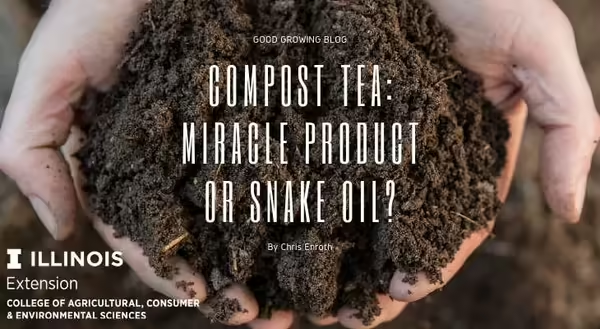
I love compost. If you have ever sat in one of my classes, you will know that 1) Soil tests can be so important, 2) Always read and follow your pesticides labels (and are those poisons really necessary?), and 3) I love compost!
Compost is derived from once-living organisms, think weeds or apple cores, or the by-product of a living organism, such as manure. Compost also comes in a variety of forms. You can have worm compost, mushroom compost, manure compost, or yard waste compost.
A trend that has been growing in popularity is to use compost to create liquid leachates to spray on our yards and gardens. This practice has been termed “compost tea”. To make compost tea a person needs some specialized equipment: A large bucket of water, an air stone or aerator to keep the water oxygenated, molasses or sugar, a burlap sack, and compost. The compost goes in the burlap sack and placed in the bucket of water to steep like a tea. Meanwhile, the molasses or sugar goes in to jump-start bacterial growth, and the air stone keeps the bubbles coming so the bacteria don’t suffocate. It sounds very folksy, at least to me. Additionally, making compost tea seems like a lot of work. And to do what exactly?
The claims made by those companies that sell this product and individuals that have developed their own recipes is that by brewing a concoction of microbes in this liquid and spraying it on your plant leaves, you create competition for all the bad plant pathogens and in effect have fewer disease problems on our plants. Moreover, compost tea works as a liquid fertilizer.
So does compost tea really work? No. Well, not really. It does give a feeding directly to the foliage of plants, even though plants can’t absorb all the nutrients through their leaves. More importantly, scientific studies are showing that compost tea often has no effect on disease control, in fact, some scientists claim the opposite effect occurs with more disease!
Compost placed around plants as mulch does have beneficial effects on reducing soil-borne diseases. That has been documented repeatedly. And it does make sense to think that soil-dwelling organisms that decompose once-living material would have an effect on the soil. But why are we to assume these soil-dwelling microbes will have a beneficial effect outside of the soil on plant leaves?
There are so many microbes to study, that each compost tea solution would have a different ratio of microscopic living things, making this a very difficult concept to study. It is difficult, if not impossible, to isolate a single part of a compost tea concoction for study.
Which leads to my next point, not all microbes found in compost are good for humans. There are serious human health concerns due to those who spray compost tea on fruits and vegetables because if you are stimulating good bacteria, would you also be enhancing the growth of bad bacteria, like E. coli? Using an aerator is touted to prevent the growth of harmful bacteria, but lab studies have shown otherwise.
And yes, there are people who believe in this product so much that they will drink it. Rather reminds me of the tales of RoundUp salespeople that would drink RoundUp to show farmers how safe it was.
There is a way to make compost tea without using air pumps and molasses. Spread a one- to two-inch layer of compost on the ground around your plants and let nature make the tea for you.
Good Growing Tip of the Week: Will compost tea save the world? Not according to current science. Science and the compost tea industry disagree on the effects of compost tea. Save yourself time, money, and electricity and use compost in the landscape. Leave the tea in the kitchen.